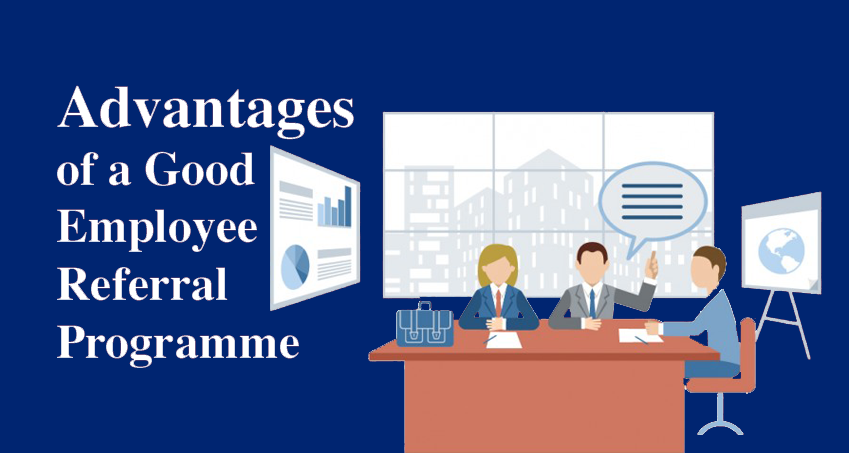Advantages of a Good Employee Referral Programme

Employee referral programme is where organisations identity and hire people from the social network pool of the existing employees and in return the employee receives a referral bonus. It’s a win-win situation.
The reasoning behind using this method of hiring is simple, if you have a good employee, the chances of that employee knowing more people like him are quite bright and there are figures to prove that Employee referral programme across the globe have shown positive results. Employee referral programmes have led to high-quality referrals.
The employee base that an organisation has is it’s backbone. You might have a good product or service in place but if you don’t have skilled people to run the show, the chances of your business surviving are rather bleak. So hiring the right people for the job is of paramount importance for the company. And here is where employee referral programme have been tremendously successful.
Why ERP has been so successful?
Faster to hire
Looking for the right candidate using methods other than ERPs is a long and tedious process. It starts with putting in the requirement to receiving a bulk load of resumes which is then followed by the screening process. This process at times takes months. In comparison, in the employee referral programme, all you have to do is interview the candidate that has been referred. When employees get people from their social network, they do the initial screening and selection for the company; this not only saves the company their money but also a significant amount of time.
Cost effective
Traditional hiring involved various costs, like advertising about the position, job fairs and payment to recruiting agencies. But in ERPs, your employee does the advertising; if they are happy they will spread the word about the work culture within the organisation. They will start looking into the contacts they have, be it their social circle, ex-colleagues or people from the industry. And if you have a good set of employees working for you, they are bound to know more people with similar talent and attributes.
In ERPs, the only cost that the company incurs is the internal promotion and administration and the referral bonus for the employee for every successful conversion. The monetary and non-monetary benefits that the employee receives are a big incentive for them to get the right people, making life easier for the recruiters.
High conversion rate
The employee with the knowledge of the organisation and the job requirements is able to guide the perspective candidate well for the interview, this leads to “superior interview” which in turn leads to a successful hiring.
Higher quality of candidates
The employee makes sure the candidate they are recommending has the desired skill set and experience, after all their reputation is on the line and suggesting a poor candidate would reflect badly on them.
ERPs far better way for hiring for specialised positions
Employees would usually know a good number of people who are from the same professional background and some of them might even have just the talent and skill that is needed. Digging into the employee pool makes it easier to kind these candidates rather than going through the traditional channels.
Adds Diversity
With people having contacts across the globe in today’s time, the number of the potential candidates have grown multifold in the current employees’ social network. This is adding to the pool of talent and leading to diversity.
Initial Productivity achieved faster
In most of the cases the current employees take up on themselves to guide and mentor the people they have referred leading to good quality of work and higher productivity amongst the new hires.
Referred hires stay longer
Ohio state university study showed that candidates hired through referral had 25% higher retention rate as compared to other methods of hiring. Reason behind this is that they already have a good insight into the working of the company through their contact who is also the current employee in the organisation. When the candidate accepts the offer it is with a good idea about what they are getting into. And also the fact they have people they already know working with them, makes the new place from friendly and less alien, lowering the attrition rate.
Referral hires perform better
It is seen that the referral hires are a better ‘fit’ than the ones who come through the conventional ways. The employee knowing the organisation as well as any recruiter can suggest people who are right for the job. So when you get the right people in, the performance will no doubt be better. This leads to job satisfaction and loyalty.
Low termination rate
As has been discussed above, the referral being screened and selected on the basis of talent and skill and good mentoring by them after the referral has been hired , this leading to high productivity and conversely to low termination rate.
Higher retention among the current employees
Establishing a good job referral programme within the organisation has more benefits attached to it than being able to hiring good talent. It is seen that with a good ERP in place, employees are keener to know about the goals and achievements of the company, which in turn develops a sense of loyalty towards the organisation. This clubbed with all the benefits they can avail every time they get a correct candidate, is a big morale booster and results in higher retention with in the current employees.
For every Employee Referral Programme to be successful, everything boils down to having an organisational culture where the workforce is satisfied. Only and only if the employees are happy will they get others to join them.

